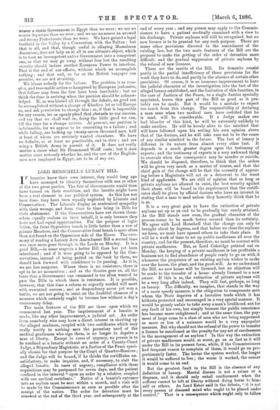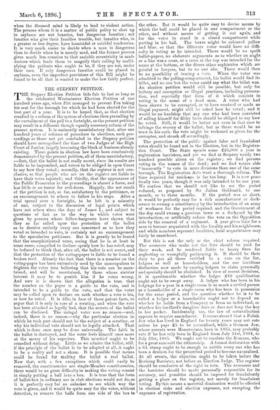LORD HERSCFIELL'S LUNACY BILL.
IF lunatics knew their own interest, they would long ago have managed to identify themselves with one or other of the two great parties. The fate of Governments would then have turned on their condition, and the lunatic might have been a real element in our political system. As this has not been done, they have been equally neglected by Liberals and Conservatives. The Liberals display an academical sympathy with their wrongs, and from time to time bring in Bills for their abatement. If the Conservatives have not shown them- selves equally zealous on their behalf, it is only because they have not had equal opportunities. For the purpose of legis- lation, the front Opposition bench is little better than a row of private Members, and the Conservative front bench is more often than not found on the Opposition side of the House. The cere- mony of reading a Lunacy Acts Amendment Bill a second time was once more gone through in the Lords on Monday. It is a good Bill,—in some respects a better Bill than has yet been introduced ; and if it were going to be opposed by the Con- servatives, instead of being patted on the back by them, we should look forward with confidence to its passing. As it is, we are less sanguine. Where there is no resistance, there is apt to be no momentum ; and as the Session goes on, all the force that a Government can command is too often wanted to pass the Bills to which there is resistance. It is possible, however, that this time a reform so urgently needed will meet
with unwonted success ; and as despondency never yet won a battle, we are not going to insist on the doubtful chances of a measure which certainly ought to become law without a day's unnecessary delay.
The main features of the Bill are those upon which we
commented last year. The imprisonment of a lunatic is made, like any other imprisonment, a judicial act. An order from somebody who may have a direct interest in shutting up the alleged madman, coupled with two certificates which may really testify to nothing save the pecuniary need of the medical gentlemen who sign them, is no longer to deprive a man of liberty. Except in cases of urgency, no person is to be confined as a lunatic without an order of a County-Court Judge, a Stipendiary Magistrate, or a Justice of the Peace speci- ally chosen for that purpose by the Court of Quarter-Sessions ; and the Judge will be bound, if he thinks the certifitates nn- .satisfactory, to make inquiries, and, if necessary, to visit the alleged lunatic. In cases of urgency, compliance with these requisitions may be postponed for seven days, and the patient confined in the interval "upon an order by a relative, coupled
with one medical certificate." Notice of a lunatic's entrance into an asylum must be sent within a month, and a visit will be made by the Commissioners as soon as possible after the receipt of the notice. ' The order for detention must be renewed at the end of the third year, and subsequently at the end of every year ; and any person may apply to the Commis- sioners to have a patient medically examined with a view to his discharge. Private asylums will still be recognised, but no new licence is to be granted for any such purpose. There are many other provisions directed to the amendment of the existing law, but the two main features of the Bill are the proposal to make the getting of the order of detention more difficult, and the gradual suppression of private asylums by the refusal of new licences.
These are the merits of the Bill. Its demerits consist partly in the partial insufficiency of these provisions for the work they have to do, and partly in the absence of certain other provisions. Of course, it is an immense improvement to have the judicial character of the investigation into the fact of the alleged lunacy established, and the limitation of this function, in the case of Justices of the Peace, to a single Justice specially appointed, leaves this part of the Bill as good as it pro- bably can be made. But it would be a mistake to expect too much from this change. The responsibility of declaring a man sane when two medical men have certified that he is mad, will be considerable. If a Judge makes one bad blunder of this kind, he will be extremely unlikely to make another. He will be keenly alive to the mischief that will have followed upon his setting his own opinion above that of the doctors, and he will take care not to be the cause of any similar mischief in the future. The fact of lunacy is different in its nature from almost every other fact. It depends in a much greater degree upon the testimony of experts; and the testimony of experts is a very awkward thing to overrule when the consequence may be murder or suicide.
We should be disposed, therefore, to think that the orders
will be given very much as a matter of course, and that the chief gain of the change will be that the necessity of appear- ing before a Magistrate will act as a deterrent to the worst kind of applicants. We are still of opinion that so long as private asylums are allowed to exist, the best security against their abuse will be found in the requirement that the certifi- cates shall be given by official doctors who have no interest in stating that a man is mad unless they honestly think that he is so.
It is a very great gain to have the extinction of private asylums set up as an end to be gradually but surely attained.
As the Bill stands now even, the gradual character of the process seems to be much better secured than its certainty. We agree with Lord Herschel' that the change can only be brought about by degrees, and that before we close the asylums we have, we must have opened others to take their place. It will be a work of time to set up public madhouses all over the country, and for the present, therefore, we must be content with
private madhouses. But, as Lord Coleridge pointed out on Monday, the keeping of a private madhouse is too profitable a
business not to find abundance of people ready to go on with it whenever the proprietor of an existing asylum wishes to make over the house, the plant, and the good-will. As we understand the Bill, no new house will be licensed, but no objection will be made to the transfer of a house already licensed to a new owner. If this is so, the extinction of private asylums will be a very long affair indeed. They will last, perhaps, as long as lunacy. The difficulty, we imagine, that stands in the way of a more speedy measure, is the obligation to compensate men
whom the State deprives of a lucrative trade which it has hitherto protected and encouraged in a very special manner. It would be grossly unfair to take away a man's livelihood, not for any fault of his own, but simply because the public conscience has become more enlightened ; and at the same time, the pay- ment of large sums to a class of men who are being suppressed as more or less of a nuisance would be a very unpopular measure. But why should not the refusal of the power to transfer a licence be sanctioned as the penalty for any act of carelessness in the management of an asylum? In this way the extinction of private madhouses would, at worst, go on as fast as it will under the Bill in its present form, while, if the Commissioners had frequent reason to complain of them, it would go on pro- portionately faster. The better the system worked, the longer it would be suffered to live ; the worse it worked, the sooner it would come to an end.
But the greatest fault in the Bill is the absence of any definition of lunacy. Mental disease is not a crime or a disgrace, and it should only entail confinement when the sufferer cannot be left at liberty without doing harm to him- self or others. As Lord Esher said in the debate, "it is not every person of diseased mind who ought to be placed under control." That is a consequence which ought only to follow
when the diseased mind is likely to lead to violent action. The persons whom it is a matter of public policy to shut up in asylums are not lunatics, but dangerous lunatics ; not lunatics who give their families trouble, but lunatics who, in a greater or less degree, have homicidal or suicidal tendencies. It is very much easier to decide when a man is dangerous than to decide when he is merely mad, and the former process gives much less occasion to that amiable eccentricity in mad- doctors which leads them to magnify their calling by multi- plying the patients who ought to be, if they are not, under their care. If only dangerous lunatics could be placed in asylums, even the imperfect provisions of this Bill might be found to be all that is wanted to make the law fairly perfect.



































 Previous page
Previous page